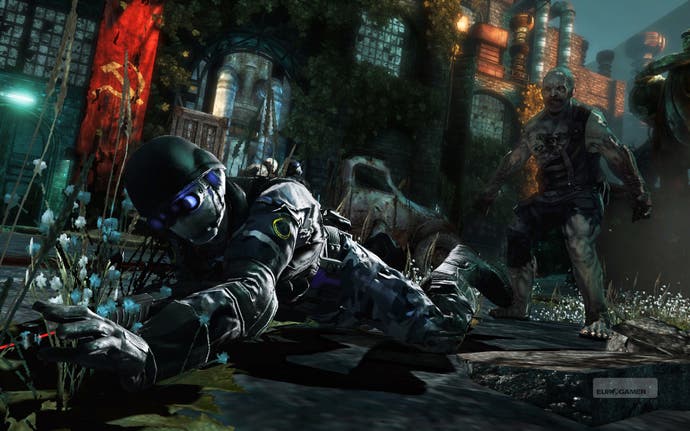Singularity
Black hole fun.
The TMD can also spit out shockwaves to repel encroaching enemies and balls of time-freezing energy that can be used to - PC gamers from 1997 will see this one coming - stop spinning fan blades so you can pass through them. For reasons that aren't explained terribly well, it also ends up being a gravity gun. The reasons don't matter, of course, because gravity guns are excellent.
So it's a bit Half-Life 2 as well. In fact, it's more than a bit Half-Life 2, because it does that clever Valve thing of changing up the way you play often enough to avoid fatigue setting in. There are plenty of run-and-gun sections, but then you get a new weapon, or you're given some advice that changes the way you play.
You're told that all the zombie enemies in one section are blind, for example, so rather than continue worrying about shotgun ammo you just tread carefully, with the tension heightened by your compulsion to gather all the upgrade canisters you can see resting very close to blind monsters in a feeding frenzy.
Then there's a massive spider-like boss that stalks you through the sewers. And the bit where you have to raise a sunken ship, climb aboard and then rescue a secret bomb from the cargo hold while it sinks again. Sometimes you go back in time and have to rewrite history by shooting someone who you saved in an earlier flashback to a burning building. Later the timelines start overlapping. It's bonkers.
The story does make some sense, but mostly it's pantomime silliness, and it's all the better for it. There's a mysterious woman with a cut-glass British accent, who is a representative of some sort of secret tin-hat organisation with a scary website, and the man you find yourself running errands for is trying to stop an evil Russian chancellor who wants to manipulate time to take over the world. (Or is he trying to stop him? Etc. etc.) Some of the accents are borderline Python.

On the downside, the upgrade systems for weapon and player are a bit perfunctory, although good enough to keep you ticking along. Also, like almost every FPS game ever made, there are times that you become acutely aware that you're running down a long mazy corridor with fireworks in it, spending a disproportionate amount of time collecting shiny objects. And some of the enemies are slightly annoying, like the knee-high exploding spider things.
But there's no sense of needing to persevere; no resistance to sticking with it beyond the next checkpoint rather than switching off and going to bed. Singularity is a straightforward, frivolous game where something new and entertaining is always just around the corner, whether it's a sniper rifle with a slow-motion zoom function, or a gaggle of giant mutant komodo dragons that shoot rockets from their eyes.
Very little here hasn't been seen elsewhere before, but Singularity has more to recommend it than simply being a polished, entertaining collection of well-executed clichés and set-pieces. It's the first game I've played in ages that realises first-person shooters can bundle in as much philosophy and as many moral dilemmas as they like, but fundamentally they're still about shooting monsters in the face, and so what it lacks in originality it makes up for in variety, pacing and exuberance. First-person shooters are always silly! Well done to Raven for making one that likes being silly.
Nobody was online to play Singularity multiplayer at the time of review, but there are two modes, Extermination and Creatures vs. Soldiers, the latter of which puts one team in control of the game's menagerie of nasties while the human team wields the TMD.



